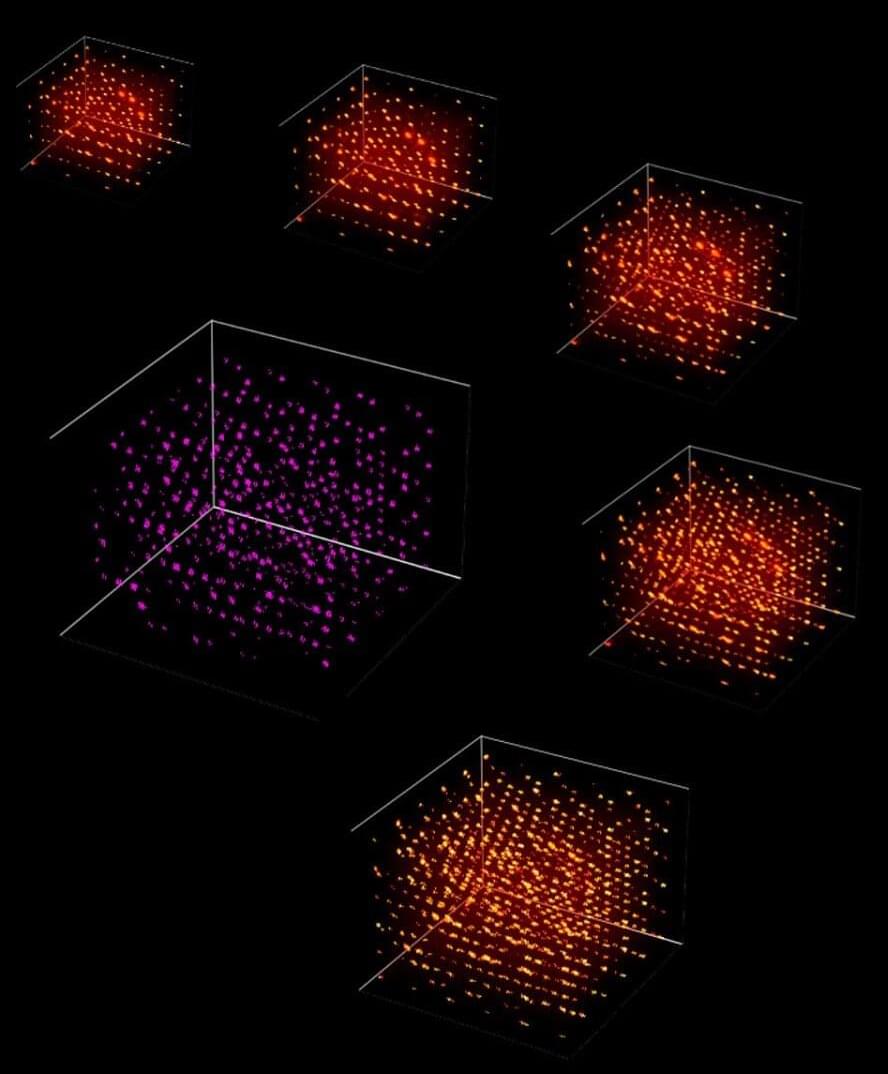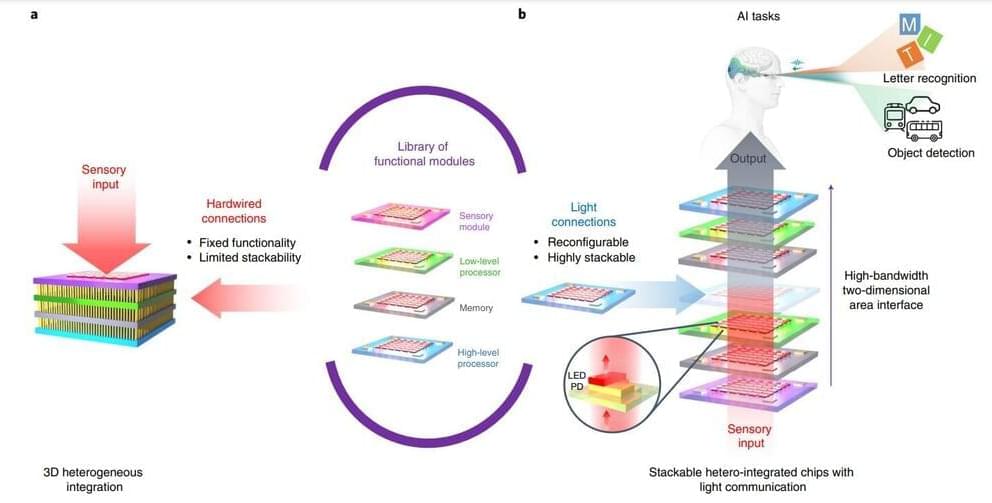They ve got it swimming.
Ghost Robotics makes the robotic dog, and the “tail” system that enables it to swim is called the Nautical Autonomous Unmanned Tail, or NAUT.


Electrons and their behavior pose fascinating questions for quantum physicists, and recent innovations in sources, instruments and facilities allow researchers to potentially access even more of the information encoded in quantum materials.
However, these research innovations are producing unprecedented—and until now, indecipherable—volumes of data.
“The information content in a piece of material can quickly exceed the total information content in the Library of Congress, which is about 20 terabytes,” said Eun-Ah Kim, professor of physics in the College of Arts and Sciences, who is at the forefront of both quantum materials research and harnessing the power of machine learning to analyze data from quantum material experiments.

Charging technology provider EV Safe Charge has unveiled ZiGGY – a mobile robot that can charge an EV wherever it’s parked. Through its ability to recharge itself via different energy sources and its summoning feature, ZiGGY can alleviate the need to install specific parking stalls for EV charging, as any spot can now become a spot to recharge.
EV Safe Charge currently provides end-to-end charging solutions, particularly as it pertains to mobile charging. The company created a mobile rental charging solution for the launch of Jaguar’s I-PACE EV and works with several other OEMs like Audi, Mercedes-Benz, Nissan, Porsche, and Stellantis.
Previously, EV Safe Charge has helped find its clients ideal charging solutions based on their needs, recommending charging technology from a multitude of partners including ABB, Enel X, evconnect, and Bosch.

Imagine a more sustainable future, where cellphones, smartwatches, and other wearable devices don’t have to be shelved or discarded for a newer model. Instead, they could be upgraded with the latest sensors and processors that would snap onto a device’s internal chip—like LEGO bricks incorporated into an existing build. Such reconfigurable chipware could keep devices up to date while reducing our electronic waste.
Now MIT engineers have taken a step toward that modular vision with a LEGO-like design for a stackable, reconfigurable artificial intelligence chip.
The design comprises alternating layers of sensing and processing elements, along with light-emitting diodes (LED) that allow for the chip’s layers to communicate optically. Other modular chip designs employ conventional wiring to relay signals between layers. Such intricate connections are difficult if not impossible to sever and rewire, making such stackable designs not reconfigurable.
Shield AI, an artificial intelligence company focusing on drones and other autonomous aircraft, is on a mission to build “the world’s best AI pilot.” To that end, the San Diego startup has raised $90 million in equity and $75 million in debt as part of a Series E fundraising round. The funding values Shield AI at $2.3 billion.
Hivemind employs state-of-the-art algorithms for planning, mapping, and state-estimation to enable drones to execute dynamic flight maneuvers. On aircraft, Hivemind enables full autonomy and is designed to run fully on the edge, disconnected from the cloud, in high-threat GPS and communication-degraded environments.


One such competitor, LaMDA, is the work of Google’s AI division. Built on Transformer – the company’s open-source neural network architecture – it can produce non-generic, open-ended dialogue after training on 1.56 trillion words of multi-content, public data and web text. By contrast, a typical chatbot is dependent on topic-specific datasets and has a limited conversation flow. LaMDA has 137 billion parameters, which can be thought of as the individual “synapses” combining to form the AI.
The sheer scale and complexity of models like LaMDA is leading some experts to ask profound questions about the nature of AI. In February, the Chief Scientist and Co-Founder of OpenAI, one of the leading research labs for artificial intelligence, claimed that the latest generation of neural networks are now large enough to be “slightly conscious”.
This month, another expert in machine learning has spoken out. Blake Lemoine, Senior Software Engineer at Google, believes that a form of self-awareness might be starting to emerge from the billions of connected parameters.

As artificial intelligence and deep learning techniques become increasingly advanced, engineers will need to create hardware that can run their computations both reliably and efficiently. Neuromorphic computing hardware, which is inspired by the structure and biology of the human brain, could be particularly promising for supporting the operation of sophisticated deep neural networks (DNNs).
Researchers at Graz University of Technology and Intel have recently demonstrated the huge potential of neuromorphic computing hardware for running DNNs in an experimental setting. Their paper, published in Nature Machine Intelligence and funded by the Human Brain Project (HBP), shows that neuromorphic computing hardware could run large DNNs 4 to 16 times more efficiently than conventional (i.e., non-brain inspired) computing hardware.
“We have shown that a large class of DNNs, those that process temporally extended inputs such as for example sentences, can be implemented substantially more energy-efficiently if one solves the same problems on neuromorphic hardware with brain-inspired neurons and neural network architectures,” Wolfgang Maass, one of the researchers who carried out the study, told TechXplore. “Furthermore, the DNNs that we considered are critical for higher level cognitive function, such as finding relations between sentences in a story and answering questions about its content.”
How the Matrix begins…
The technology I want to talk about today is something out of this world, but also a bit controversial There is a startup in Australia who are actually growing live human neurons and then integrating it into traditional computer chips… mind-blowing stuff!
***
WATCH NEXT:
➞ This AI Technology is a Game Changer: https://youtu.be/i5Hsx_cQY4Q
➞ Million Quibit Silicon Quantum Computer from Intel: https://youtu.be/j9eYQ_ggqJk.
➞ New WoW Processor explained: https://youtu.be/-NeRIrRSFs4
***
MY GEAR (affiliate links):
➞ Camera Sony Alpha 7 III: [https://amzn.to/3dmv2O6](https://amzn.to/3dmv2O6)
➞ Lens Sony 50mm F1.8: [https://amzn.to/3weJoJo](https://amzn.to/3weJoJo)
➞ Mic Sennheiser: [https://amzn.to/3IKW5Ax](https://amzn.to/3IKW5Ax)
***